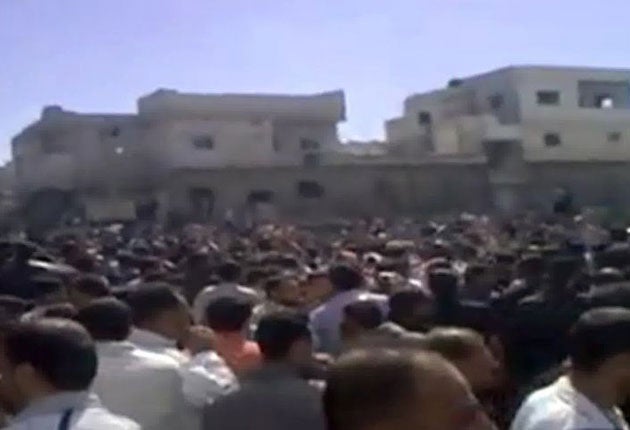Syria mourners call for revolt after deaths

Thousands of mourners called on Saturday for "revolution" at the funeral of protesters killed by Syrian security forces, the boldest challenge to Syria's rulers since uprisings began sweeping the Arab world.
Security forces responded by firing tear gas to disperse crowds in Deraa, a tribal region south of the capital where at least 10,000 people demonstrated on Saturday at the funeral of two protesters, among at least four who were killed on Friday.
"Revolution, revolution. Rise up Hauran," chanted the mourners in Deraa, administrative capital of the strategic Hauran plateau, as they marched behind simple wood coffins of Wissam Ayyash and Mahmoud al-Jawabra.
"God, Syria, Freedom. Whoever kills his own people is a traitor," they said. Some of the mourners exited a mosque and headed for the centre to protest.
The city was less tense by late afternoon after security forces dispersed most of the crowd and adopted less aggressive tactics than the previous day, residents said.
The two were killed when security forces opened fire on Friday on civilians taking part in a peaceful protest demanding political freedoms and an end to corruption in Syria, which has been ruled under emergency laws by President Bashar al-Assad's Baath Party for nearly half a century.
A third man who was killed on Friday, Ayhem al-Hariri, was buried in a village near Deraa earlier on Saturday. A fourth protester, Adnan Akrad, died on Saturday from his wounds.
Secret police at the main funeral in Deraa arrested at least one mourner, activists said. Security was heavy in the city, especially around police stations.
The city of Deraa is home to thousands of displaced people from eastern Syria, where up to 1 million people have left their homes because of a water crisis over the past six years. Experts say state mismanagement of resources has worsened the crisis.
The Hauran region, once a Middle East bread basket, has also been affected by diminishing water levels, with yields per hectare falling by a quarter in Deraa last year.
Protests against Syria's ruling elite, inspired by revolts in the Arab world, have gathered momentum this week after a silent protest in Damascus by 150 people demanding the release of thousands of political prisoners.
At least one activist from Deraa, Diana al-Jawabra, took part in the protest. She was arrested faces charges of weakening national morale, along with 32 jailed protesters, a lawyer said.
Jawabra, who is from a prominent tribe, was campaigning for the release of 15 schoolchildren arrested in Deraa this month after writing slogans on walls, inspired by revolutions in Egypt and Tunisia that swept their autocratic leaders from power.
Residents say the children's arrests deepened feelings of repression and helped fuel the protests in Deraa, the biggest threat yet to the authority of Assad.
Assad said in a January interview Syria's leadership was "very closely linked to the beliefs of the people" and there was no mass discontent.
"The leadership have given a clear signal that they are not in any hurry to embark on fundamental political reform," said a diplomat in the Syrian capital.
In a move seen as an attempt to address the discontent, Assad issued a decree on Saturday lessening mandatory army conscription from 21 months to 18 months.
The long conscription period has generated discontent, especially among the youth who resent state tactics to bring them into service, such as random ID checking, and the withholding of food aid from families whose members escaped conscription.
Join our commenting forum
Join thought-provoking conversations, follow other Independent readers and see their replies
0Comments